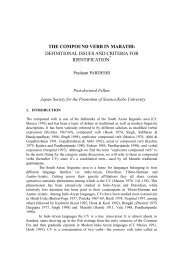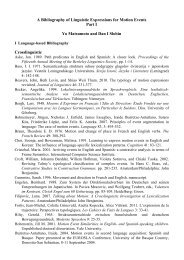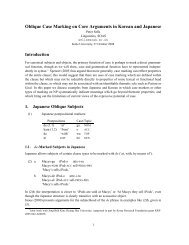Relativization and Nominalization
Relativization and Nominalization
Relativization and Nominalization
Create successful ePaper yourself
Turn your PDF publications into a flip-book with our unique Google optimized e-Paper software.
German (courtesy of Akio Ogawa)<br />
(1) a. Ich empfange den, [der morgen kommt]<br />
I receive ART ART tomorrow comes<br />
‘I receive the one who comes tomorrow.’<br />
b. Ich empfange den Mann, [der morgen kommt]<br />
I receive ART man ART morning comes<br />
‘I receive the man who comes tomorrow.’<br />
(2) a. Ich lese (das), [was Sie empfehlen]<br />
I read ART what you recommend<br />
‘I read what you recommend.’<br />
b. % Ich lese das Buch, [was Sie empfehlen]<br />
I read ART book what you recommend<br />
‘I read the book which you recommend.’<br />
(3) a. Ich empfange, [wer (auch) morgen kommt]<br />
I receive who (also) tomorrow comes<br />
‘I receive who(ever) comes in tomorrow.’<br />
b. *Ich empfange den Mann, [wer morgen kommt]<br />
I receive ART man who tomorrow comes<br />
‘I receive the man who comes tomorrow.’<br />
Middle English<br />
Middle English Dictionary (2000)<br />
which: “[a]s an independent relative with indefinite or generalized force<br />
referring to a thing, an abstraction, et., introducing noun clauses”(492)<br />
wh!: “[a]s an independent relative referring to a person or persons used as<br />
subj. or pred. nom. introducing noun clauses” (538)<br />
a. And [which falle$ on $at furste flur] schal beo Quene.<br />
b. [Who aske this] Leseth his asking trewely.<br />
Modern English<br />
a. Invite [who/whom you like]. (Huddleston <strong>and</strong> Pullum 2002:1076)<br />
b. After silence, [that which comes nearest to expressing the inexpressible]<br />
is music. (Aldous Huxley Music at Night 1931)<br />
Functional specialization<br />
what(ever), whoever, … Argument/Referring<br />
who, which<br />
Modification<br />
Part 3: Are nominalizations headless/free relatives?<br />
Sneddon (1996) on Bahasa Indonesia<br />
Bahasa Indonesia (Sneddon 1966:300)<br />
a. Mobil [yang di-beli Ali] berwarna biru.<br />
car NMZ PASS-buy Ali colored blue<br />
‘The car which Ali bought is blue.’<br />
b. Ø [yang di-beli Ali] berwarna biru.<br />
NMZ PASS-buy Ali colored blue<br />
‘The one Ali bought is blue.’<br />
“Headless/free RC?”<br />
“<strong>Nominalization</strong> occurs when the head noun is ellpited …The yang phrase<br />
then functions like a noun.” (Sneddon 1996:300)<br />
Matisoff (1973) on Lahu nominalization particle ve<br />
Overweighing this consideration [a deletion analysis] is the simple fact<br />
that an underlying Nrh [relative head nominal] is not at all necessary to<br />
explain how these sentences work. To interpret the ve-clauses as ordinary<br />
<strong>Nominalization</strong>s does not distort the meaning, <strong>and</strong> has the crucial<br />
advantage of avoiding multiplication of covert entities…Once we admit<br />
deleted Nrh’s after some ve’s, consistency would dem<strong>and</strong> that we stick<br />
them in after every post-verbal ve, even in the (very numerous) cases<br />
where the only semantically possible Nrh would be an empty one<br />
like " -c# ‘thing’ or " -l" ‘matter’. (Matisoff 1973:484-485)<br />
Deletion analysis of headless/free relatives:<br />
Adams (1972) on Ancient Greek, Weber (1983) on Quechua, Huang (2008)<br />
on Qiang (2008), Wrona (2008) on Old Japanese, et cetera, et cetera, et cetera ! "






